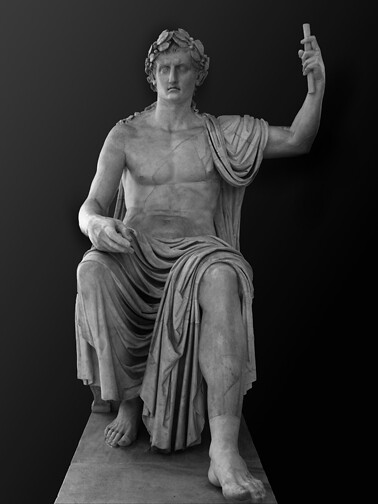
This is the second post in two-part series. In the first post, I explained the purpose and perspective of the book Jesus is Lord, Caesar is Not, edited by J. Modica and S. McKnight.
Now I would like to explain why I think the discussion and criticism of the book, a kind of caution against empire studies (but not a full-scale rejection) is a bit misguided, largely due to way we structure the debate.
First of all, let me say what many folks in the book have said.
1. They argue that “empire studies” people read too much into what is there – so minor characters and phrases are overloaded with anti-imperial meaning.
2. They argue that “empire studies” people read too much into what is not there – so, for example, when Paul writes to Rome, it is assumed the political stakes are higher because it is the imperial capital.
I agree that we need to be careful of over-interpretation. Not everything is intended by NT writers to be a slight against Caesar. Nevertheless, I simply do not like the wording often used to talk about this debate. Here are two problematic words:
Peripheral – to talk about “central” and “peripheral” is to make some things important that Paul (or John or Peter) says and other things less important. I think we throw around this language in a casual way, without offering a clear framework for how we consider something peripheral or marginal to an author. Also, to be clear, just because an author does not mention something frequently, or even explicitly, that does not mean it is unimportant to them.
Implication – we tend to treat political issues according to Paul as little more than an “implication” of the gospel, not the message itself. But, I would argue, not implications are alike, and they are not all of equal value. Some implications are very important and carry a lot of weight, and others do not.
Instead of referring to imperial matters as “peripheral” or an “implication” I would suggest that it is important for understanding the first century understanding of the gospel because it is structural. Mike Gorman uses the term “theopolitical” to explain the nature of the gospel. One cannot discard the political quality of the gospel when some of the key terms used for it involve “gospel,” “Son of God,” “Lord,” “Kingdom/Empire,” “Father,” “Savior,” and “God of Peace.” We don’t quite “get” how these words were popularized in Roman propoganda, because we don’t hear that gospel with their cultural experiences, but my own impression is that, even though these terms come from the Old Testament and Jewish ideology, is it an unfortunate or strange coincidence that they are Roman political terms as well?
Actually, Sylvia Keesmaat has a fine essay called “In the Face of the Empire: Paul’s Use of Scripture in the Shorter Epistles,” where she argues that Paul’s appeal to OT Scripture and the story of Israel “challenges the empire.” This essay is in Hearing the OT in the NT (Eerdmans, 2006).
Besides many of the most important words related to the gospel having a recognizably political public quality, I want to make 4 point pertaining to why I think empire studies (despite its penchant for exaggeration and parallelomania) is important for New Testament studies as a foundational concern (and not merely “peripheral” or “implicational”).
#1: The persecution against Christians in the first century (and into the second) had a fundamentally political nature.
From most of what we read in the NT, Christians like Peter, Paul, and John of Patmos were not persecuted for their strange religious beliefs (per se), but because it appeared dangerous to society. This is rather clear in Acts where angry crowds say, “They are acting contrary to the decrees of the emperor, saying there is another king named Jesus” (17:7). Did they really say there is another king? Or did they say “Jesus is King” and it was taken as a direct threat?
This is one sign that dismissing imperial matters as an “implication” won’t do. It is not peripheral, it is, what I would say, “structural.” The Gospel imagery is “built” with the same epistemological framework as imperial ideology.
Or, consider Acts 16:20 – “These men are Jews, and are throwing our city into an uproar by advocating customs unlawful for us Romans to accept or practice.” Notice the accusations against the Christians. They are distinctive for their practices, not their beliefs (alone).
The other day, I was telling my freshmen the story of the martyrdom of Polycarp. While I had read this tale before, what struck me on this reading was that Polycarp was given the last opportunity before he was burned at the stake to “swear by the genuis of Caesar” and to renounce Christ. Thus, Polycarp makes his famous statement – “Eighty and six years have I served [Christ], and he never did me any injury; how then can I blaspheme my King and my Savior?”
Again, you cannot separate religion and politics.
#2: Jews of the first century and before understood “salvation” often enough in political “this-worldly” terms.
If we believe that the earliest Christians continued within the streams of Judaism before a “partings of the ways” (whenever we might argue that was), could it be true that these followers of Jesus abandoned the “this-worldly” redemptive (and even political) components of the hopes of salvation? While many examples of Jewish political hopes could be mentioned, I will reserve it to one: the remembered words of the revolutionary who died in Masada (early 70sAD), Elazar ben Yair:
Since we long ago resolved never to be servants to the Romans, nor to any other than to God himself, who alone is the true and just Lord of mankind, the time is now come that obliges us to make that resolution in practice…We were the very first that revolted, and we are the last to fight against them; and I cannot but esteem it as a favor that God has granted us, that it is still in our power to die bravely, and in a state of freedom.
Could the Jewish vision of freedom and redemption from God be that different than a “Christian” understanding of God’s salvation? I am not advocating a kind of Christian version of political revolutionary mentality, but I think we can take too big of a leap away from terra firma if we separate Jesus’ understanding of redemption (let’s say as spiritual) from a “normal” Jewish perspective.
#3: The “messianic” texts of the OT (as few as they are) tend to have an irreducible “political” dimension related to Israel’s hopes of restoration, freedom, and everlasting dynasty.
Consider Ps. 2: “Why do the nations conspire…The kings of the earth set themselves and the rulers take counsel together against the Lord and his anointed…He who sits in the heavens laughs…he will speak to them in his wrath, and terrify them in his fury, saying, “I have set my king on Zion, my holy hill.”
One point I would like to make – notice how Yahweh announces the enthronement of his chosen king not before the ears of Israel, but presumably as something like a performative utterance to the world that simultaneous crowns the anointed as well as deposes the earthly kings.
#4: We need to understand just how “present” and “ubiquitous” the empire and emperor were to the people under rule.
Many scholars who balk at the claims of empire-studies proponents saying that they overdraw the importance of imperial rule. The argument is made (by Seyoon Kim for example) that the anti-kingdom of Christ’s rule is not that of Caesar, but that of Satan. For John Barclay, the emperor is insignificant to Paul because the real enemies (pulling the strings, as it were) are the “archic” (cosmic) powers.
I want to affirm, yes, Jesus and Paul saw Satan as the ultimate enemy of God. And, yes, any one earthly empire is seen as a fading and temporary ruler. But we need to try and understand what it was like to be subjugated under Roman rule for Jews (and for Christians in the first century). I think one of the best modern examples is Nazi Germany. Think about how much theological energy was spent by the likes of Barth, Bonhoeffer, Kaesemann, and others to show how Christians should resist the dictatorial will of Hitler.
I could go on and on about Bonhoeffer, but instead I will just say that when Kaesemann was arrested in 1937, it probably has something to do with the fact that just before that he had preached on Isaiah 26:13 publicly: “O Lord our God, other lords besides you have ruled over us, but we acknowledge your name alone.”
Now, when you live in an oppressive regime, it is hard to think outside of those pressures and injustices. It is hard to keep Caesar and Satan separate. You know they are not “one-and-the-same,” but you constantly deal with the “Caesar” in front of you so, for all intents and purposes, that is how you experience Satan.
In Modica and McKnight’s book, they argue (following the psychology of Maslow) that empire studies scholars only see empire and treat everything as reactionary – using only a hammer and treating everything as nails. But if we understand an oppressive context like the Roman empire well enough, it is not so much that all you have is a hammer – it is that everything looks like nails so you better get your worn-out hammer again!
Is there anyhing or any area of life that was “untouched” by the empire? Some say life was quite normal for some and people didn’t think about the empire in rural areas. I find that hard to believe. Does not every road lead to Rome?
Now, some have said that even Jesus shows a kind of casual political indifference in the text of John 18:36 (“My kingdom is not of this world”), but folks like Tom Wright have showed that Jesus did not say “My kingdom is not for this world.” Rather, it is not “of” this world. What does that mean? I think Moltmann gets this precisely right:
The oft-quoted saying…[John 18:36] does not signify that his kingdom is elsewhere, but that it is of a different pattern from this world. Yet, different as it is, it is in the midst of this world through Jesus himself. Thus it is not in accordance with Jesus’ preaching to call the kingdom ‘unpolitical’ or to banish it into another sphere, that of heaven or of the heart. The kingdom is political in a quite different way, and politically, it is quite different from the systems and rules of the struggle for world domination and revenge” (see The Crucified God, p 140)
Summary and Conclusion
Again I will say that I think empire studies has helped us see the political importance of the gospel. We must not allow that to be all “this-worldly,” nor blend religion and politics into civil religion. I like to say the gospel is [lower-case “p”] political, not [upper-case “P”] Political. There is an irreducibly theopolitical and even counter-cultural dimension to the gospel. It is not against culture as culture, but because so much of the way we do society is driven by power, greed, and lust, the gospel resists such things and calls for another way.
I am not satisfied with referring to “empire” or “politics” as central-vs-peripheral. Nor am I happy with calling it a mere “implication.” I think the best term is “structural.” Jesus preaches about the “empire of God” and he establishes himself as governor and sovereign of that empire. This must be a political statement because it is de-constructive. For Jesus to make himself out to be a universal ruler must, in some way, erode the authority of the currently-reigning regent. The language of the gospel itself is built around neo-political language and imagery.
When I spoke to a small group of students about this a couple of weeks ago, I gave this example:
Let’s say an employee of Lexus own an Audi and says to a friend at a work picnic, “I love my new Audi – it is perfection!” [Everyone there knows that Lexus’ tagline is ‘The Relentless Pursuit of Perfection.] So, what does his statement mean for Lexus? Is the man criticizing Lexus? Perhaps, perhaps not; his statement is about Audi, but it must be de-constructionistic. We may call this an implication, but it happens to be a major implication.
Now, at the end of the day, you may say, “big deal, who cares.” There are a lot of critical matters in scholarship where I think very little is at stake. However, with this matter, it can have quite a large effect on how one views the gospel and its relevance and impact on society. One of the reasons I am so appreciative of the proponents of empire studies is that this subject has inspired serious engagement between church and society. I think of people like Stanley Hauerwas. In his classic text (co-written with William Willimon), Hauerwas wrote several years back:
We would like a church that again asserts that God, not nations, rules the world, that the boundaries of God’s kingdom transcend those of Caesar, and that the main political task of the church is the formation of people who see clearly the cost of discipleship and are willing to pay the price.” (48).















